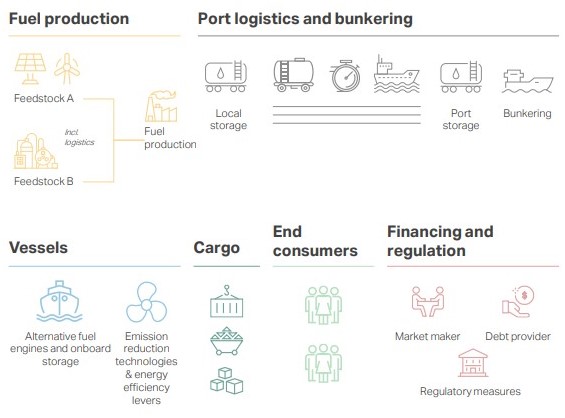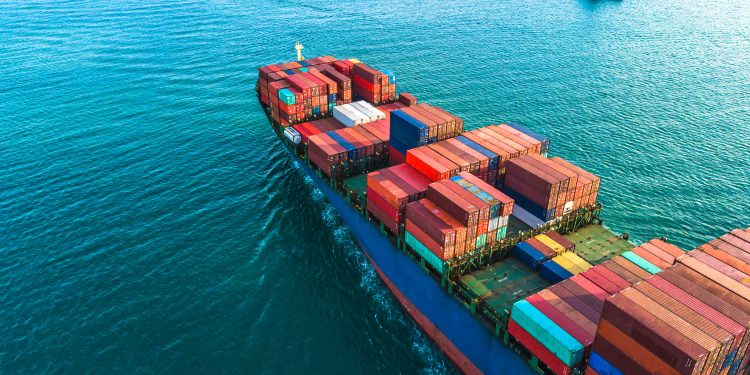The Mærsk Mc-Kinney Møller Center for Zero Carbon Shipping, in a joint effort with McKinsey & Company, has developed a new blueprint for assessing the feasibility of green corridors.
The blueprint provides an approach to designing and demonstrating the feasibility of green corridors. It is intended to serve as a ready-to-use guide for any stakeholder involved in green corridors for decarbonizing shipping.
How can the blueprint be used?
- The blueprint is intended to serve as a ready-to-use-guide to conduct feasibility assessments for any stakeholder involved in green corridors
- The guide can be used by individual stakeholders assessing feasibility at single steps of the supply chain and in concerted action across the green corridor eco system
- The guide is a phased, stepwise methodology that over the course of seven chapters outlines the key questions and analysis that each member of the supply chain should consider to assess the green corridor’s feasibility
- The blueprint brings together all the analyses in the final chapters and highlights the key actions that must be taken to turn the corridor from an idea to reality
- The resources required for the feasibility assessment depends on the scope of the green corridor and maturity of the supply chains involved
- The blueprint is a living document that will evolve and be refined over time as the sector gains more knowledge and hands-on experience with realizing green corridors
Green corridors are increasingly seen as an essential part of the solution, viewed as catalyzers to the transition toward zero carbon shipping. Establishing green shipping corridors, where vessels can run on alternative fuels, will be an essential step to decarbonize shipping.
However, there is still limited knowledge on how to take green corridor concepts from ideas to implementation.
The purpose of the feasibility blueprint is to provide a framework for a deeper evaluation of the selected green corridor scenario to determine its technical, economic and regulatory feasibility and identify levers and actions to mitigate potential gaps and risks
#1 Identify sources of alternative fuel best suited to meet future demand
- Fuel demand: Create high-level estimate for future demand for alternative fuels over time;
- Create overview of existing and planned alternative fuel production (near corridor/import to corridor);
- Assess availability of feedstocks for required fuel supply – understand current and potential hubs from feedstock perspective;
- Estimate gap between fuel demand for the corridor and expected supply from import/expected production centers;
- Select potential sourcing and type of alternative fuel to be used in green corridor.
#2 Identify the current and expected storage and bunkering infrastructure along the corridor
- Identify current and potential bunkering locations and demand profile for vessels running on alternative fuels;
- Create overview of existing port, storage, and bunkering infrastructure along with planned future investments in facilities;
- Describe ownership and operatorship of port and bunkering infrastructure;
- Assess whether port/bunkering infrastructure has green corridor potential.

#3 Specify the characteristics of vessels in the corridor, technical profile, and emissions
- Create overview of owners and operators of vessels active in the corridor;
- Develop overview of number and type of vessels operating within and in/out of corridor;
- Identify vessel routing behavior;
- Identify technical profile of vessels active in corridor;
- Estimate annual fuel consumption on corridor based on high-level assessment of annual fuel consumption for ships on corridor;
- Calculate corridor emissions;
- Assess if key characteristics of vessels are a good fit for a green corridor.
#4 Develop an understanding of the trade flows including type, nature, and ownership
- Map the current and projected cargo trade flows and growth (volume/value);
- Describe the nature of cargo along corridor (origin destination);
- Map key stakeholders related to cargo;
- Assess if trade flows and cargo are a good fit for a green corridor.
#5 Assess the high-level financing and regulatory characteristics on this route
- Assess the financing environment relevant to the corridor (considering possible local specificities);
- Identify existing regulatory requirements at international, national and, as needed, local levels;
- Identify health, safety and environmental policies that impact the decarbonization of the corridor;
- Assess the challenges and opportunities presented by the financing, regulatory, and stakeholder environment.




























































